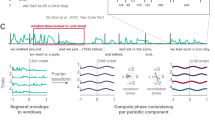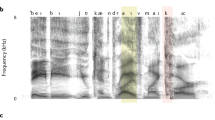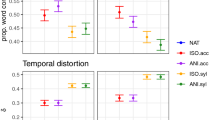Abstract
THE purpose of the experiment reported here was to examine the function of hesitation pauses in speech. Pauses were conceived of as serving the selection processes which direct the course of verbal sequences, and as involving acts of choice. They were expected to occur where linguistic solutions fitting the speech intentions are not readily available, or where automatic verbalization is rejected in favour of ‘newer’, more specifically selected verbal expression.
Similar content being viewed by others
Article PDF
References
Hughlings, Jackson, “Affections of Speech from Disease of the Brain”, Selected Writings, 2 (London, 1932).
Shannon, C. E., Bell System Tech. J., 30 (1951).
Author information
Authors and Affiliations
Rights and permissions
About this article
Cite this article
GOLDMAN-EISLER, F. Speech Production and Language Statistics. Nature 180, 1497 (1957). https://doi.org/10.1038/1801497a0
Issue Date:
DOI: https://doi.org/10.1038/1801497a0
Comments
By submitting a comment you agree to abide by our Terms and Community Guidelines. If you find something abusive or that does not comply with our terms or guidelines please flag it as inappropriate.



